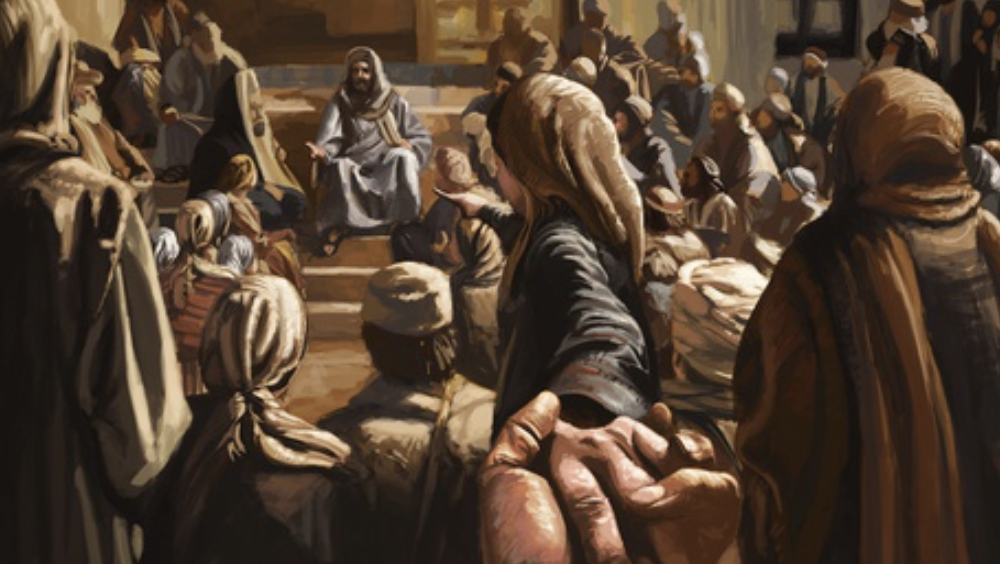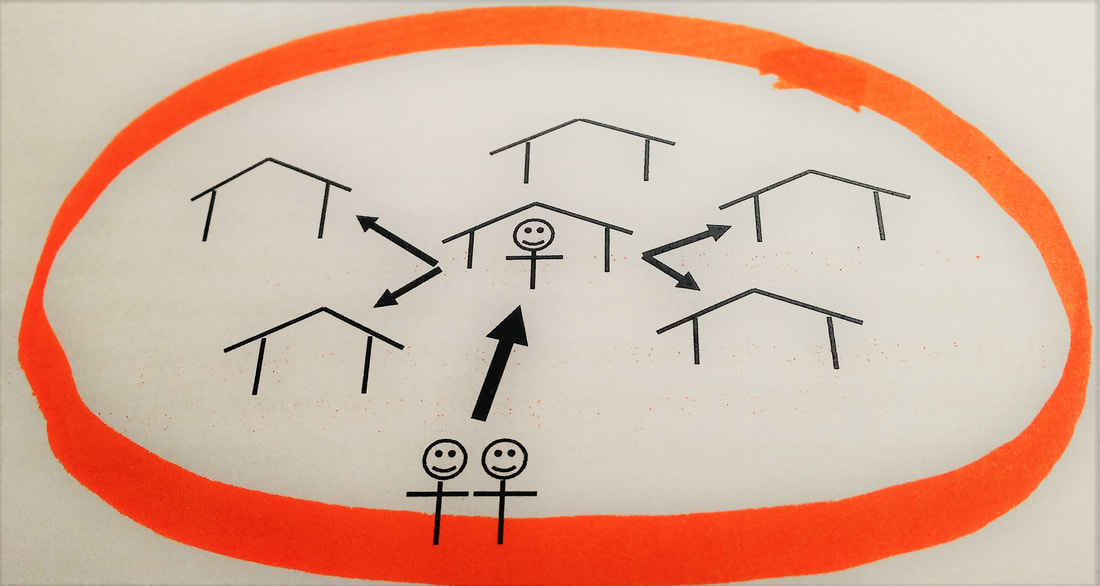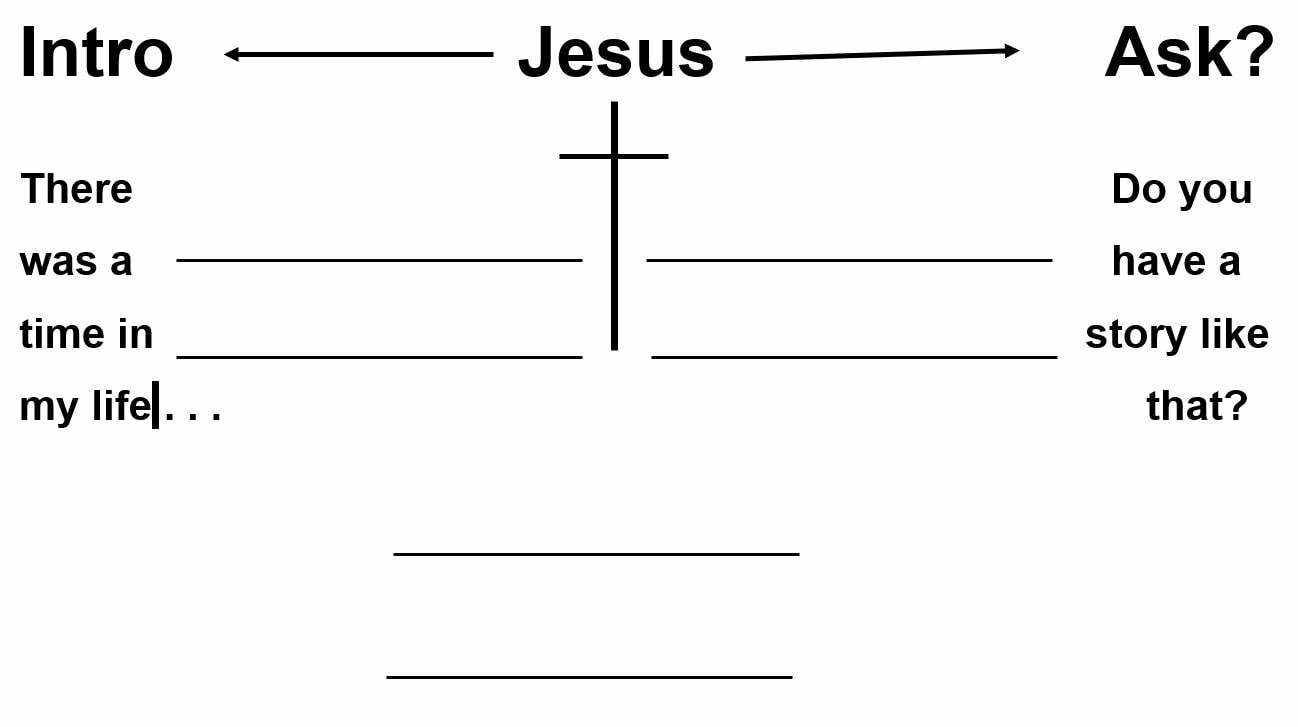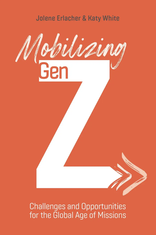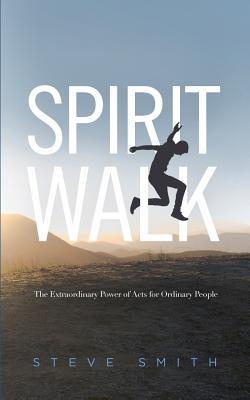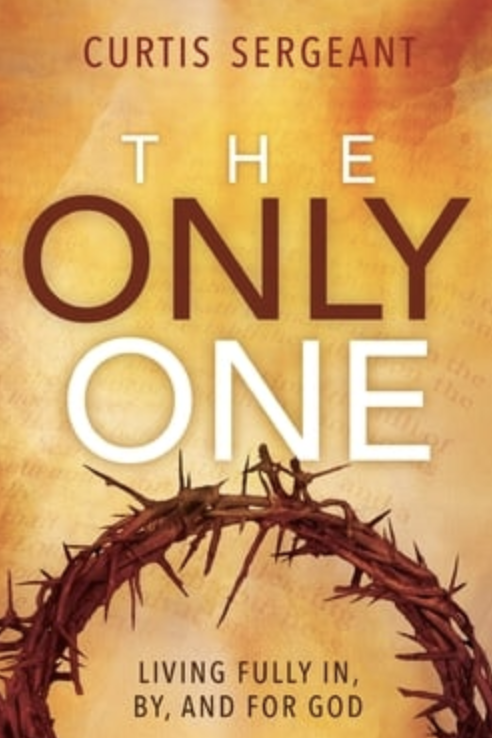|
In the first few chapters of John an interesting pattern emerges. The numbers of those following Jesus begins to grow as his followers simply invite their friends, family or, in the case of the woman at the well, entire village to "come and see."
To be sure, none of those activities are wrong and God uses all of them to help people come to faith - they are simply not the example of Jesus' first followers in the first four chapters of John (John 1:39; 1:41-42; 1:45-46; 4:28-30). For them, "come and see" was enough. It seems they knew that if they could just get their friend to spend some time with Jesus - even a cynic like Nathanael - that would be enough. And Jesus is still enough today. Like his first followers, we can ask our friends to come and see Jesus by sharing the stories of Jesus from the gospels and by inviting them to read these stories. We can do this by inviting them read through one of the gospels with us or we can invite them to into a discovery Bible study using one of several story sets:
My default has been to invite people to church or to open up deep philosophical conversations with my far from God friends. God has of course used both of these tactics, but increasingly I'm learning (and trying to learn) to default to simply asking them to come and see Jesus for themselves by inviting them to read the gospels with me. How about you? How have you been inviting people to Jesus lately? Did you find this post helpful? Share it with a friend.
0 Comments
What is the person of peace? It's a term that is increasingly used both in the church and in the mission field. Practitioners of disciple making movements (DMM) often talk of searching for the person of peace and yet different groups use the term in different ways. All are correct but for those just beginning to explore the idea of the Person of Peace, a clarification might be in order. Some define the Person of Peace (PoP) as anyone who welcomes and opens up their relational network to to the messenger - be that a missionary or a local lay believer crossing the street in their neighborhood. In this use, the PoP doesn't necessarily need to be someone who initially accepts the message, but rather gives permission to the messenger to share with the group. They are often a gatekeeper of sorts - an elder of the village or the patriarch of a family. God is using them to open the door for the message to go forward in their context. This is also sometimes referred to as a House of Peace. A second way the idea of the Person of Peace is used is to simply indicate someone whom God has prepared to receive the gospel. They are a seeker, a God prepared person. Perhaps they've had a dream or a vision or have had a crisis in life that caused them to do some deep soul searching. Their heart is prepared to respond to the gospel. They are ready to receive the messenger and the message. A final way I often hear to idea of the Person of Peace discussed is that they not only are prepared to receive the gospel, but they are also ready and able to reproduce and share the good news with other. They receive the message and the messenger but they also readily receive the mission. When the woman at the well believes Jesus in John 4 she immediately takes that message back to he village where she tells everyone the good news and brings them to Jesus. Many would also refer to this person as a "Fourth Soil Person" who reproduces 30, 60 or 100 times from the Parable of the Sower. All of these definitions work but as you are reading the literature or listening to interviews with practitioners, it is helpful to understand how they are using the term. It was a bit confusing for me the first time I ran into the different ways it was being used. Perhaps there are other ways to think about the Person of Peace. If so, let me know your thoughts in the comments. Until then, I'd encourage you to download this discovery tool to help you learn about the Person of Peace from Jesus' ministry in the gospels. Trainer's notes are included on page three. As we immerse ourselves in the story of the scriptures, we allow the Holy Spirit to use them to shape our view of the world, of ministry and of ourselves. Scripture hammer trainings allow a trainer to step out of the way and allow the Bible to do the heavy lifting of the training. They require little charism on the part of the trainer, are hard to argue with and place a tool in the hands of those we are training that is immediately reproducible.
The basic idea is to create a list of scriptures that all point toward the basic Biblical principle or lesson you are wanting your trainees to grasp. A scripture hammer study is best done in groups of 2-5 and then debriefed as a group. You can create your own for any topic you'd like to train on. I've created a one page handout with six scripture hammer studies that I've learned from others and that I've been using to train. The focus of these particular studies are:
[CLICK HERE TO DOWNLOAD THE SIX STUDIES] I've written previously about a few of these topic and you can check those out at the links below:  One of the number one reasons former Muslims give for leaving Islam and coming to faith in Christ is that they met a true follower of Jesus. The challenge is that the vast majority of the 1.8 billion Muslims in our world today live in places where there are no followers of Jesus. In Turkey for example, a nation of over 80 million, fewer than 10,000 have left Islam to follow Christ and eighteen of the country’s 81 provinces have no known churches. Most Turks will not hear a clear presentation of the gospel this year - perhaps not in their lifetime. They won’t have a friend who is a follower of Jesus. It is much the same for Hindus, Buddhists and the followers of the world's many other religions who live in what missiologists call the 10/40 window. 95% of the world's unreached people groups live in the 10/40 window. Globalization is bringing the people of the world to countries where there are churches in every neighborhood and Christians all around them. Technology is opening up the world to communicate with one another in ways never before imagined. English is the new lingua franca and it is easier than ever to connect with a unreached peoples - and their families - and to be the first true follower of Jesus they have ever met. Covid-19 is a terrible disease that is bringing and will continue to bring great loss to our world. But it is also bringing opportunity. Children across the globe have been sent home from school. They are isolated and oftentimes alone and are spending their time online. Your children are home. Muslim children are home. Hindu children are home. Buddhist children are home. What would it take to help your child be the first real Christian one of these children has ever met? What would it look like if you could help your child build a friendship with a child their same age and gender from another country? There are dozens of online communities working to connect children with other children and adults with other adults through the age old practice of pen pals. Some help you connect through traditional mail. Many more are helping make connections through email. I want to invite you to consider praying as a family about becoming pen pals with new friends in the Muslim world. Imagine if each member of your family were connecting with people in a Muslim majority country. Imagine how much you would learn about the world. Imagine the encouragement you could bring to an individual who is also living through this current world crisis. Imagine the conversations about Jesus that just may happen as you hear the story of your new friend’s life and they hear yours. Getting Started I want to first and foremost, encourage you to do this as a family. Your kids are going to make easy connections as they share about what they do for fun but depending on their age, they’ll probably need some coaching. And you, mom and dad, are going to need your kids to keep you accountable to continue to reach out and connect through email or regular letters with new friends. Be a family on mission together! When I first helped my son with pen pals in Turkey and Indonesia he was twelve. We went onto the website Pen Pal World together and I helped him set up his profile. We prayed about what countries to look into and then searched together for boys age 12 that he could connect with. He reached out to two and they both responded. Soon they were exchanging emails. They were super simple. At one point the thread of emails was over 70 replies between the two of them. One would ask a single question - “Who’s your favorite soccer team? - and the other would respond “Real Madrid,” and then send off a single question of their own, “What’s your favorite movie?” It felt a little ridiculous but they were two twelve year old boys getting to know one another. This boy happened to live in Indonesia. I monitored and checked in with my son regularly, encouraging him and helping him know how to proceed. Below are three sites through which you can find pen pals in the Muslim world. All three have their users create profiles which include the user’s gender, age and country. Be sure and help your children find friends who are the same age and gender - and that goes for you too! And then pray about what countries in which you would like to make connections. It’s a great reason to explore and learn about countries within the 10/40 window. A great resource to tune up your heart for these nations is Prayercast where you can learn about every country in the world. https://www.prayercast.com/ And a great resource to help you and your family learn more about Islam and how to share the love of Jesus with Muslims is the Bridges study. https://www.crescentproject.org/bridges Interpals Interpals started in 1998 and has been helping people make new friends across the globe ever since! You can sign up for free. You’ll need to create a profile and then you can search the profiles of others to find someone to write to. You can start by messaging on the Interpals website. This will all happen on their on-site inbox, which means you won’t need to give out personal information at first. Take some time to get to know the person you are connecting with. You will want to switch over to email though so that your conversations can happen more naturally. https://www.interpals.net/ PenPal World Like Interpals, PenPal World has also been active since 1998. Like Interpals, you will sign up, build a profile and search the profiles of others, then communicate within a PenPal World inbox. They also have some helpful safety features. They manually verify every single profile photo, and they enable minors to block all adults. http://www.penpalworld.com/ Global Penfriends Global Penfriends was established in 1995, and is a safe platform that runs in a very similar way to Interpals and PenPal World. It is completely free, and you set up a profile, search for others, and have a secure inbox. Unique to Global Penfriends is their My Post service, which enables members to send snail mail to each other via the internet! You can use this service to send any written correspondence: letters, postcards, birthday cards, invitations, etc. https://www.globalpenfriends.com/ Parents, you will want to look at each and see which suits your needs best. Please remember that these sites are secular sites open to anyone with an email address. They are for profit and so it is in their very best interest to make the sites as safe as possible. That said, it is up to you to stay safe and remain vigilant. You and your children have an opportunity to build real friendships and to be Christ’s ambassadors in a lost and broken world. And you can do it together! Learn more about unreached people groups and the 10/40 window in the short video below. Did Jesus give the Apostle Paul a strategy for reaching the nations? Yes, he did and it is a strategy for our day as well. Steve Addison often quips that we need to stop asking 'What would Jesus do?' and start asking another question: What did Jesus do? Luke 10:1-23 offers us a window into one of the things Jesus did and it is a window into both his methods of discipling his followers as well as a strategy he uses to reach into new areas with the gospel. It is a strategy that the Apostle Paul employs throughout his ministry and is especially visible on his second missionary journey as recorded in Acts chapters 16 - 18. This is of course not the only strategy that Jesus gives his followers nor is it the only strategy for reaching into new harvest fields that the Apostle Paul uses, but within Luke 10 are a number of examples and principles that we, like Paul, would do well to pay attention to and at the very least, try out. They are not the way we in the west usually go about things but they are the way that Jesus taught his first followers to take the gospel into new regions. Let's look at a few of the examples and principles from Luke 10. Pray for Harvesters In Luke 10:2 Jesus tells the 72 to pray for more workers. This is interesting because as sent ones, they are the workers. The implication seems to be that there are workers in the harvest! As Paul worked through Macedonia and Greece, the leaders of all of the churches that emerge in Acts 16 - 18 are new believers who came out of the harvest. Paul did not lead these churches. There is no mention of him even planting churches. Paul made disciples (Matthew 28:18-20) and churches emerged as new disciples were raised up and began to share the gospel and make disciples. Find the Person of Peace Jesus instructs the 72 to find a peaceful person, someone who welcomes them into their home. He gives them further instruction that, if a peaceful person cannot be found, they should brush the dust off of their feet and move on. It seems that there will be a God prepared person who welcomes them, or their won't be. The presence of that person or lack their of is out of their hands. It is a work of the Father who draws people to Jesus. Paul trusts Jesus' strategy. For Paul it looks like this: Enter a new town or context. Find the place where people gather - usually a synagogue. Preach the Gospel. Get kicked out. Discover that there are a handful of people who want to follow Jesus. When Paul proclaims the gospel there are always three responses as clearly articulated in Athens in Acts 17:32-33. When they heard about the resurrection of the dead, some of them sneered, but others said, “We want to hear you again on this subject.” At that, Paul left the Council. Some of the people became followers of Paul and believed. Paul knew that there would be three response:
Stay with the Person of Peace As part of Jesus' instructions, he also tells the 72 to not move around from house to house but rather to stay with the person of peace. Jesus does not tell us why we should stay, but in the example of Paul we see the fruit of staying in place. Paul is not the local who will establish the movement in each town. The local person - the cultural insider - will be the one to stay. Lydia, the Philippian Jailer, Jason in Thessalonica, the elders in Berea, Dionysius and Damaris in Athens, Aquilla and Priscilla in Corinth as well as Crispus the synagogue ruler and his entire household! These are the people who become the leaders of the gospel movements in each of their respective regions. Paul has stayed with them, he's shared meals with them and invested in raising them up to be disciples of Jesus! This is perhaps most clearly seen in Thessolonica where Paul spent just three Sabbaths [learn more]. Everywhere Paul goes he finds a person of peace, a God prepared person whom God is going to use to establish the local expression of faith. Paul has no plan to leave a “church planter” behind to lead the new church for a time. It seems that from the very beginning the plan is to have a new believer lead the church. These are just three of the principles from Luke 10 that Paul applies as he works to obey Jesus and make disciples. A deeper study of the sending out of the 12 in Luke 9, Matthew 10 and Mark 6 would be be helpful to further compare how Paul took the example of Jesus and applied it to his efforts to take the gospel to the very ends of the earth. If Jesus' example and the principles of Luke 10 were good enough for Paul, it seems we ought to at least look at these passages and explore what applying them to our current context might look like. A sermon given at Hillsboro Mennonite Brethren Church on the strategies and disciple making process of Jesus in Luke 10:1-24.
This week I'll be co-teaching a workshop on refugee outreach at Crescent Project's National Conference. My colleague James will begin that workshop with a short devotional from Luke chapter 7 where Jesus is asked to heal a centurion's servant. It's a story that has caused me a fare amount of conviction the past few weeks as I've meditated on it. I'll hope it does the same for you. Jesus has just finished teaching the masses when a group of elders from the Jewish synagogue show up to ask him to come and heal a Roman centurion's servant who has fallen ill. Roman centurion's were the senior officers of a legion of Roman soldiers. Roman soldiers who are occupying Israel. Roman soldiers who have brutalized and oppressed the Jewish people. Already this story is a bit crazy. But when these elders get to Jesus they don't just ask, they plead with Jesus saying, "He is worthy for You to do this for him, for he loves our nation, and he is the one who built us our synagogue." Jesus goes with these elders and the story ends with the centurion telling Jesus he doesn't need to come, he just needs to say the word. The centurion understands authority and Jesus famously praises the man saying, "I tell you, not even in Israel have I found such faith." This is the part that is most often the focus of the story but let's go back to the request of the Jewish elders. In every respect, the Roman occupation has been a terrible blight on the Jews in Israel. And yet here are the oppressed pleading the case of a man who is supposed to be their enemy. Why? Because he loves them. He has poured out his love in generosity. He has lived a life among them that has demonstrated extraordinary love. And the question James challenges us with is this: Is your church living in such a way with the refugee and immigrant communities in your context that if the government came to shut your church down, would refugees and immigrants be the first ones to come and plead your case? Would refugees in your community come out saying, "No, you can't shut this church down! They've loved us. They've helped us with extravagant generosity." Do our churches have a centurion's reputation? Crescent Project is LIVE STREAMING all main sessions! FREE!
THEME: Uncharted: Boldly Following Jesus
Register for FREE TODAY and claim your access! Here's the process:
Daily sessions times begin:
Gather some friends and join us! I’ve had a great summer. One of the highlights has been connecting online with Ali, an Egyptian engineer. We connect every Monday over lunch and it’s been a joy to get to know him and his family. We have recently started reading through a creation to Christ overview in the Bible. Next week we’ll tackle Genesis 3 and the fall. Ali is Muslim. I am the first true follower of Christ that he has ever met and this is the first time he has read the Bible. This summer I’ve also connected regularly with Mustafa, a young Muslim man in Syria and Mohammed, a Muslim college student in Lahore, Pakistan. It has been a joy to build a relationship with both of them. I’ve been able to connect with them because of Embassy. Hundreds of thousands of Muslims living in hard to reach countries speak your language and are going online to find friendship, language partners and answers to their questions. Embassy exists so that they will meet a committed follower of Christ. Embassy offers training, encouragement and community and then helps you discover new Muslim friends online. “Embassy volunteers use secular, public-access forums to connect with Muslims in closed countries who speak English. As men and women begin to read the Bible and engage in questions about Jesus, we invite them to include their friends and family in the conversation: small seeds growing to something great (Matthew 13:31-32).” * Embassy is an amazing opportunity for the North American church to be on the front lines of the great commission.
What could God do through the local church? Through your local church? Imagine if you - yes you reader - were to go back to your home church and help form an Embassy Team. Imagine if you could gather a group of friends who would begin reaching out individually online while also meeting regularly as a group to pray together, encourage one another and continue with ongoing equipping. God is on the move in the Muslim world and this is an opportunity to join in that work. Steps to Forming Your Embassy Team
“The Great Commission is for every church in every culture in every generation. There are no exclusions. But . . . every church in every culture in every generation must determine the way in which they respond to this responsibility -- in a way that is appropriate to time and context." Forming an Embassy Team is your opportunity to respond. You can learn more about Embassy and sign up to volunteer at their website: https://www.crescentproject.org/embassy Stories About Embassy Encounters * This quote is from the Embassy homepage.
In John 4, Jesus talks with a Samaritan woman at well outside of her town. During this interaction, the woman begins to suspect and even believe that Jesus might be the prophesied messiah. Leaving her water jugs, she rushes back to her community where she proclaims, “Come see a man who told me everything I did. Could he be the messiah?” We don’t know a lot about this woman, but the result of this simple statement is that the people of her villiage come out to see Jesus for themselves and many believed. Jesus spends two unplanned days with the townsfolk who end by saying, “We no longer believe just because of what you [the woman] said; now we have heard for ourselves, and we know that this man really is the Savior of the world.” [read the story here] We have learned to use this story as a teaching tool at our E2E training events. It answers a few questions to help us share the gospel:
The woman goes back to her community; her friends and family and acquaintances. This is her relational network. And our own relation networks are who we can begin to share with and for whom we should be praying regularly [Read: Personal Prayer Strategy]. The woman shares two things. The first is a one sentence summary of her story. The second is a question pointing to the gospel. Those are two ways we see the good news shared in the New Testament: personal testimony and gospel presentation. These are what we can share. And when does the woman begin to share? After her seminary training? After her confirmation class or new members class? No. The woman begins sharing immediately! She has discovered good news and she will not be stopped. With today’s article we want to look at that middle question: What do we share? We’ve previously written about a helpful tool for sharing the gospel called The Three Circles. There are a lot of great gospel sharing tools, but this is one we train people to use at E2E events. We also train everyone how to share their story in 15 seconds. This is just a smidge longer than the Samaritan woman’s testimony but the purpose is the same: to invite people to learn more about Jesus. This is something we’ve learned from the No Place Left coalition. We use the diagram below as a teaching tool to help shape our 15 second testimonies. There is also a great training video that I’d encourage you to watch both to craft your own 15 second testimony but also to have as a tool to train others. We aren't using the 15 second testimony to explain the fullness of the gospel. We use it to open up spiritual conversations that give us a chance to hear someone’s story and to invite them to come and discover Jesus for themselves. [Read an example of how this was shared] Crafting Your 15 Second Testimony
Watch the video below and allow Troy Cooper to train you to share your 15 Second Testimony. Your Assignment
It was noon and I was meeting my new friend Musa* for an hour over my lunch break. We’d decided to meet at our favorite coffee shops to connect. I’d first met Musa when he had reached out looking for someone to practice his English with. He’d had a lifetime of classroom instruction in his home of Cairo, Egypt* but had few native English speakers with whom he could practice. The first time we met we covered the bases of getting to know one another. Where are you from? What is your family like? What do you like to do in your free time? The sounds of Arabic were all around him in the busy Cairo coffee shop where he sat. I then asked Musa what he did for a living. He is a young guy, in his early twenties and had just gotten started working as a mobile phone app developer. Then he returned the favor and asked me what I do. I’m in full time ministry so this is always an interesting question to answer. But I dove in. "I help people in churches in America understand and follow Jesus. That is pretty broad but it involves teaching, training, coaching, encouraging and casting vision with leaders and regular people. I'm not going to get rich, but I do find tremendous fulfillment in doing the things that I believe that God has made me to do. I bet that sounds a little crazy, but that's what I do and really it's who I am." I could tell He didn’t completely understand what I was talking about so he asked a few more questions but then moved on, wondering if I’d been to Turkey. He’d recently visited Istanbul and loved the city. I told him of our four and a half years living there and how much we loved the people we knew there. We meandered in and out of topics and then he asked a serious question, “I hope to hear an emotional situation you have been through?” I thought for a few minutes and then told him about a recent struggle I’d been facing and about how our family had spent time praying for God’s wisdom and healing. It was good to be transparent with my new friend even though it felt a bit hard and I wasn’t sure he was following everything. Musa’s English is good but he hasn’t had a lot of experience talking about personal topics. When I was finished, I said, “What about you? Have you been through any hard situations in life?” Musa was contemplating his answer when he looked at his watch. He gave me a wry smile. “I’ll have to tell you next time. I’ve got to go now. But let’s make sure and meet again.” As Musa left, I wondered about our conversation. Had I said too much about what I do? Should have I asked more questions about his faith and beliefs? Should I have offered to pray for him before he left? What if I had said something wrong? I spent some time praying for our time together asking the Lord to use it for his glory and to reveal himself to Musa. And then I removed my headphones and shut down Facebook Messenger on my laptop computer. I got up from my seat in the corner of my coffee shop in South Dakota, grabbed my mug and headed up to the counter for a refill. Though we were half a world away, Musa and I had enjoyed a great cup of coffee and better conversation. We continue to connect regularly, oftentimes just texting back and forth, sometimes hopping on a video chat to say a quick hello and at other times, setting aside an hour to grab a cup of coffee for an extended talk. To my surprise, Musa had quickly moved into questions of faith. I’ve introduced him to Discovery Bible Study and we are slowly working through a creation to Christ story set. We read a passage of scripture - I paste it into Messenger and he reads the Arabic and I read the English. We then ask some simple questions to help us discover what the story says about God, about people and about how we should live our lives. It’s been slow because Musa often brings up his own questions - questions that are stretching me and forcing me to dig into my own faith and theology. We started with his questions about the Christian idea of a triune God. We’re now pressing into the validity of the Bible. And those conversations are packed in between talk of family and culture and food and movies and dreams for life. It’s a whole lot of fun. I am the only true follower of Jesus that Musa knows. I’ve been able to pray for him and continue to pray for him regularly. Musa is one of many young guys that I am connecting with online all across the Muslim world and someday, I hope I will be able to meet all of them in person, if not in this life, then in the eternity of heaven. That is my prayer for each of them. There are 1.7 billion Muslims in the world today and collectively, Christians are sending one missionary into the Muslim world for every 405,000 Muslims.[1] This has to change. John Stott has said, “We must be global Christians with a global vision because our God is a global God.” Because of advances in technology and the globalization of our world, millions of people throughout the Muslim, Hindu, Buddhist, Animistic and un-religious worlds are working to learn English. They are going online to try and find people with whom they can practice speaking. A new door of missionary activity has opened and it is open to everyone who is a follower of Jesus and has an Internet connection. Geography is no longer a barrier to your relationship with a Muslim like Musa. C.T. Studd said, “If Jesus Christ be God and died for me, then no sacrifice can be too great for me to make for Him.” Will you sacrifice an hour a week to invest in a relationship with a young man or woman in the Muslim world who is looking for friendship and someone to practice English with? Let Us Help You
*For security, names and places have been changed. 1 - http://www.thetravelingteam.org/stats |
The E2E Community
Categories
All
Good Books
Archives
April 2024
|
Proudly powered by Weebly

